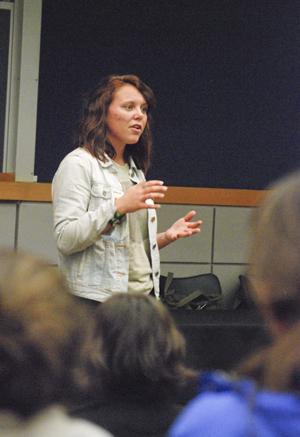
The post was written by Hatchet reporter Cat Barnao.
About 50 students gathered in Funger Hall on Monday night for GW Invisible Children’s screening of a documentary, part of the nationwide movement seeking to raise awareness about Africa’s longest running war in northern Uganda.
The audience heard from a Ugandan woman who escaped abduction from rebels in her country as a teenager.
When when the rebels came to her village, Stella Mistica recalled with horror how she pretended to be an old woman so the rebels would not abduct her. Mistica now mentors girls who return home after being abducted.
She stressed the importance of young people across the world fighting to end the tragedy in her country.
“The youth can do more to help their fellow youth, because youth understand their fellow youth,” Mistica said. “That is why we show students the film.”
The film “Tony,” created by the national Invisible Children organization, is about a teenager growing up during the civil war between the Ugandan government and the Lord’s Resistance Army. The conflict has lasted 23 years, uprooting more than 2 million civilians from their homes and abducting thousands of children into the rebel army.
The 60-minute film depicted the ordinary aspects of Tony’s life as a teenager—listening to rap and going on Facebook—and the less ordinary, spending nights huddled with other children on damp concrete floors, fearful that the rebels of the LRA would come to kidnap them to fight in their army of child soldiers.
“GW students are so politically driven and internationally driven,” said Megan McDonough, president of GW chapter of Invisible Children. “It’s important for us to know what’s going on.”
Pi Beta Phi, Phi Sigma Sigma, GlobeMed, Stand, Amnesty International, Voice Gospel Choir, the African Student Association and College Democrats co-hosted the event.




